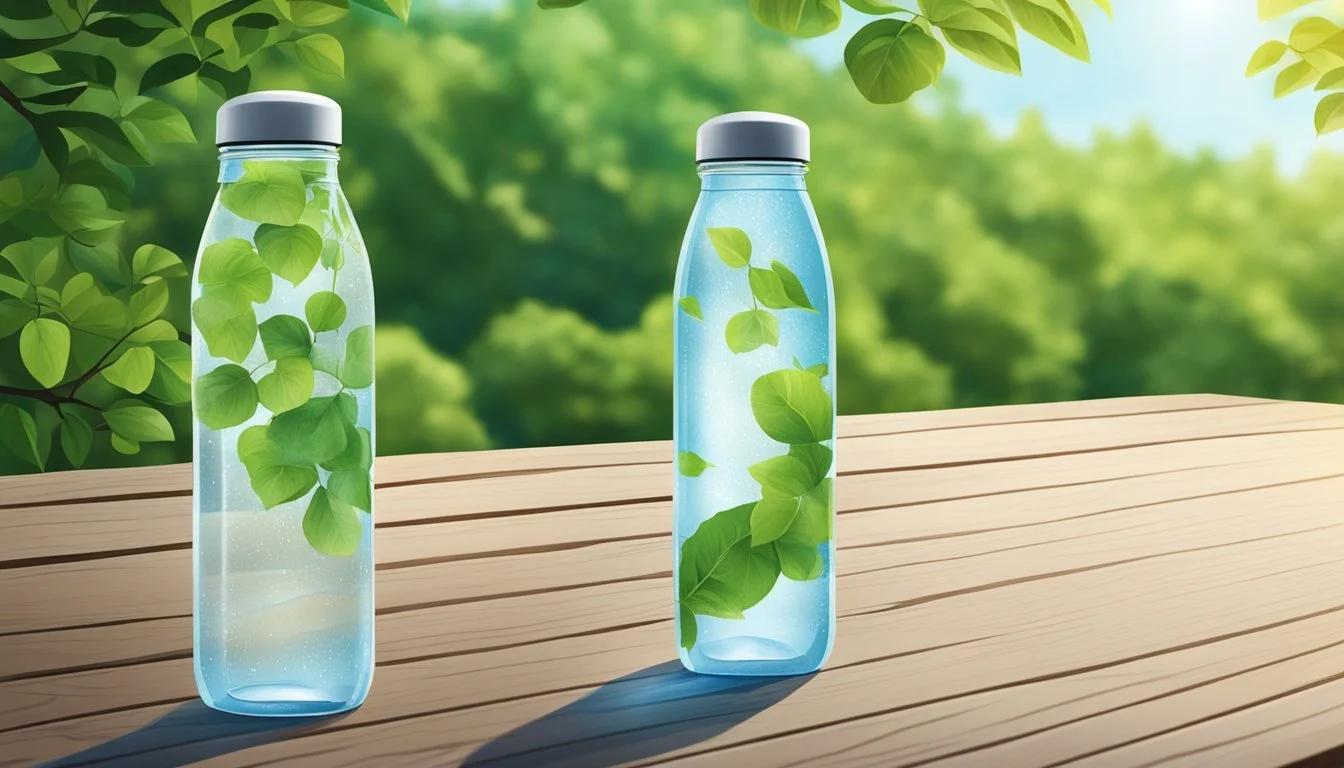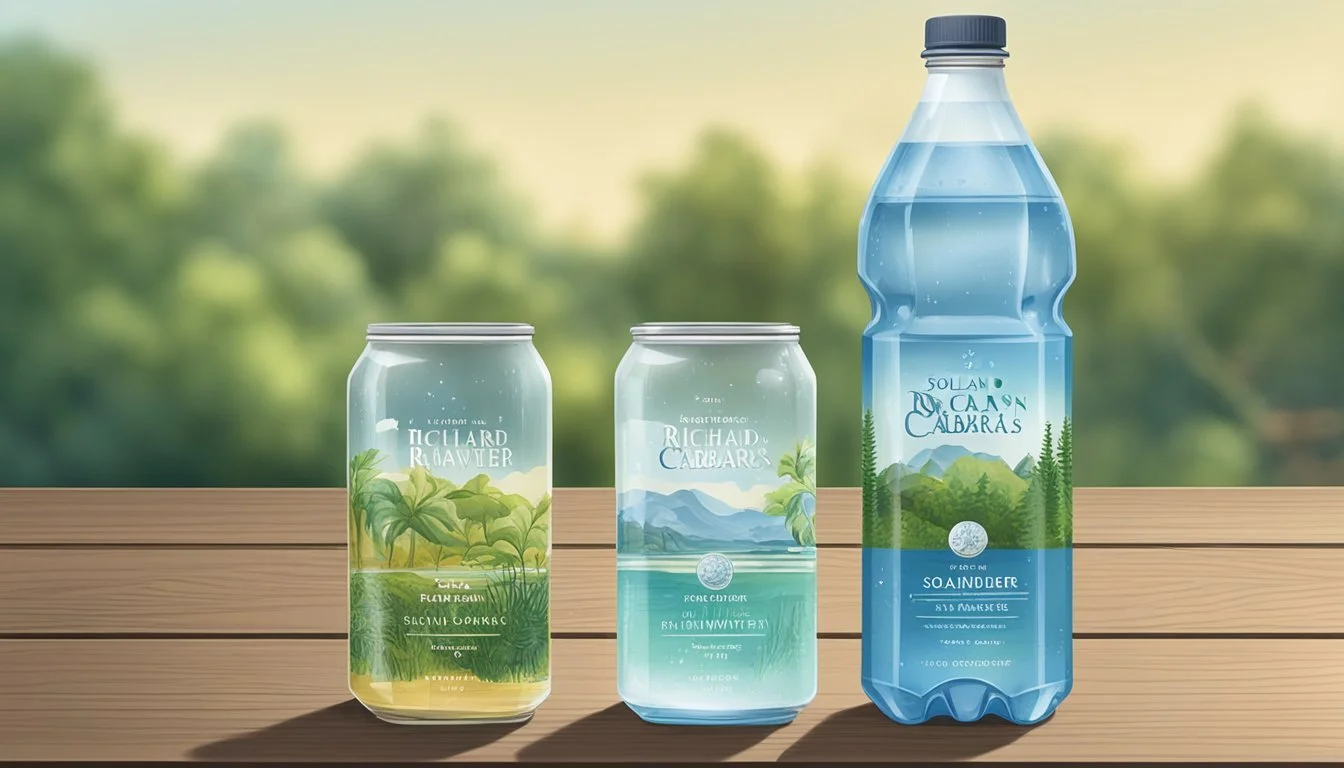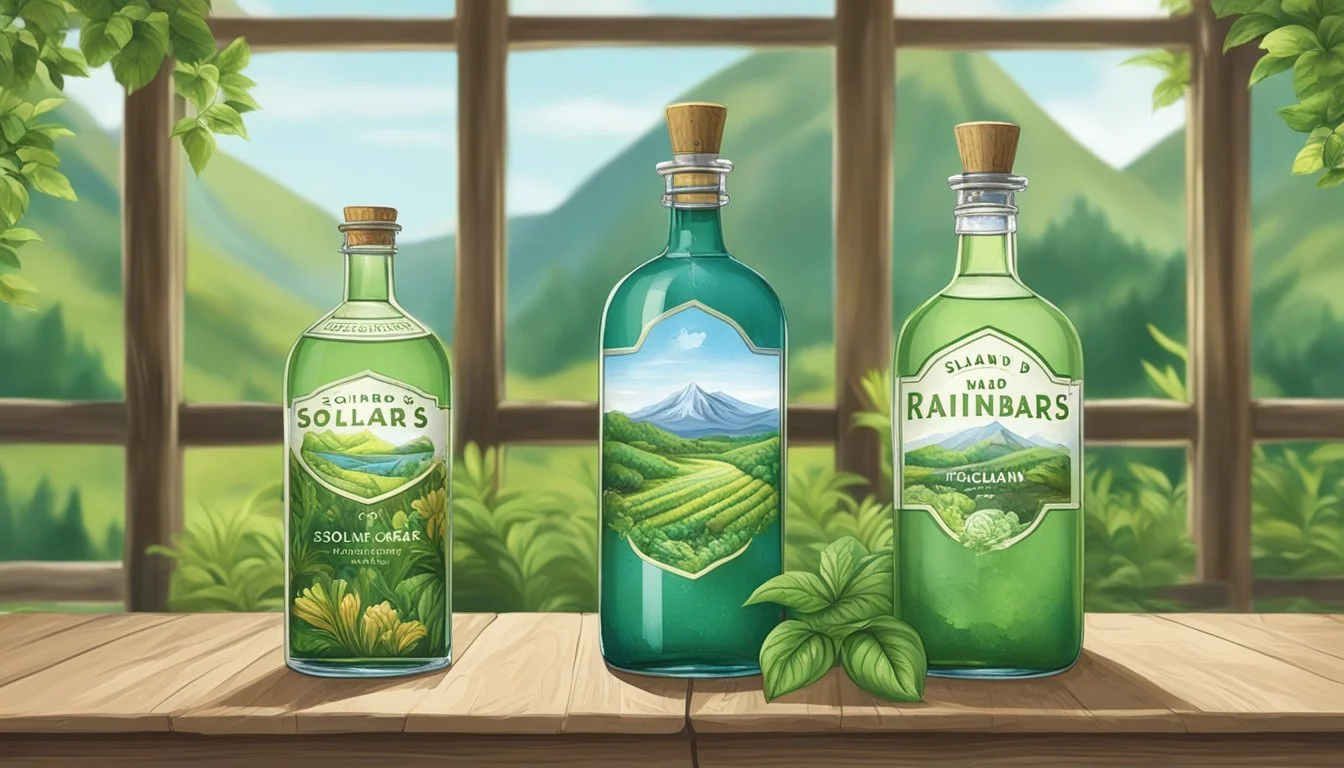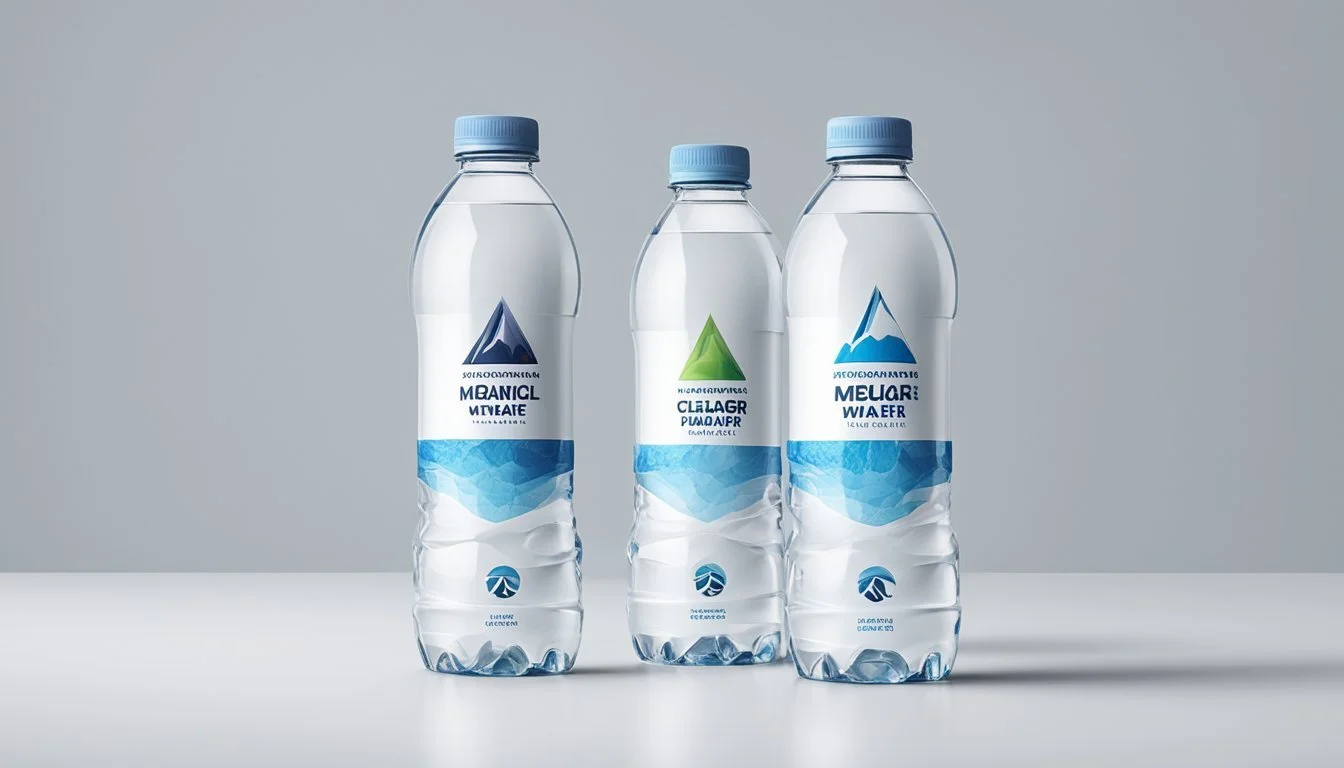Solan de Cabras vs. Richard’s Rainwater
A Comparative Analysis of Bottled Waters
When comparing Solán de Cabras and Richard's Rainwater, two standout brands in the bottled water market, it’s clear each brings unique qualities to the table. Solán de Cabras, sourced from a natural spring in the Serranía de Cuenca Mountains in Spain, offers a rich heritage and a distinctive mineral composition. This water is revered not only for its purity but also for its historical significance, dating back over 3,600 years.
Richard's Rainwater, on the other hand, offers a modern twist on bottled water by harvesting rainwater. This method ensures the water is naturally filtered and clean, bypassing traditional water sources. Richard's Rainwater prides itself on being sustainable and pure, aiming to provide a fresh and environmentally friendly option for consumers.
These differences highlight the unique characteristics each brand offers. For those seeking a premium, naturally sourced mineral water with a storied past, Solán de Cabras stands out. Meanwhile, consumers looking for a more sustainable, innovative approach to bottled water may find Richard's Rainwater particularly appealing.
Understanding Bottled Water
Bottled water is a popular choice for many due to its convenience and perceived purity. It is sourced from various locations, including springs, wells, and even rain.
Types of Bottled Water:
Spring Water: Naturally filtered by underground rock formations.
Mineral Water: Contains natural minerals, typically from a spring.
Purified Water: Processed to remove impurities through filtration methods like reverse osmosis.
Rainwater: Captured directly from rain and then filtered for purity.
Minerals in bottled water include calcium, magnesium, and potassium. These minerals contribute to the taste and nutritional value of the water.
Filtration and Quality: Filtration processes are critical in ensuring the water is free from contaminants. Methods include:
Carbon Filtration: Removes chlorine and organic compounds.
Reverse Osmosis: Eliminates a wide range of impurities and minerals.
UV Treatment: Kills bacteria and viruses.
Quality assurance ensures that the bottled water meets safety standards. Regular testing is conducted to verify the absence of harmful substances.
Purity and Source: The purity of bottled water depends on its source and the filtration methods used. Bottled water from natural sources, such as springs, is often sought after for its clean taste and natural mineral content. Rainwater, considered one of the purest forms, is carefully filtered to maintain its integrity.
Bottled water offers a convenient and often healthier alternative to tap water, especially in regions where the water supply may be compromised.
History and Origin
The origins of Solán de Cabras and Richard’s Rainwater are deeply rooted in their unique natural environments and historical contexts. Each brand offers a distinct background that enhances their reputation and appeal.
Solán de Cabras Heritage
Solán de Cabras boasts a rich legacy that spans thousands of years. Originating from the Serranía de Cuenca mountains in Spain, this natural mineral water has been naturally filtered for over 3,600 years. The thunderstorms in this region create rainwater that seeps into the underground aquifer, undergoing a lengthy filtration process. Minerals like bicarbonate, calcium, sodium, potassium, and magnesium enrich the water, contributing to its balanced composition. This historic spring is situated 3,000 feet above sea level, emphasizing its pristine origin.
Richard’s Rainwater Beginnings
Richard’s Rainwater offers a modern and sustainable approach to bottled water. The company collects and bottles rainwater, ensuring it is 100% potable. This method highlights the purity and freshness of the rainwater used. Emphasizing environmental responsibility, Richard's Rainwater proudly donates water where needed. This innovative solution addresses water scarcity and promotes sustainability, positioning Richard's Rainwater as both practical and conscientious in today's market.
Water Sources and Filtration
This section delves into the origins and natural processes that define Solán de Cabras and Richard's Rainwater, highlighting their distinctive approaches to sourcing and filtering water.
The Spring of Solán de Cabras
Solán de Cabras finds its origin in the Serranía de Cuenca Mountains in Spain. This region is renowned for its pristine natural springs and aquifers, which have been a source of pure drinking water for centuries.
The water undergoes natural filtration through layers of mineral-rich soil and rocks. This process provides Solán de Cabras with its unique mineral composition and clean taste. The water is untouched by human intervention until it is bottled, preserving its purity. Historically, this water was cherished by Romans and has continued to uphold its high standards of quality and healing properties through generations.
Collecting Richard’s Rainwater
Richard’s Rainwater takes a different approach by harvesting rainwater. Located in the United States, it focuses on capturing rain directly from the sky before it touches the ground, ensuring it is free from pollutants found in surface or groundwater.
The rainwater is collected through a sophisticated system that maximizes efficiency and is stored in sanitized conditions. This method allows for a sustainable and carbon-neutral water source. By concentrating efforts on high-efficiency, near zero-waste filtration, Richard’s Rainwater claims to infuse more back into the drinking water system, emphasizing its positive environmental impact and higher yield of potable water.
Natural Filtration Processes
Both Solán de Cabras and Richard’s Rainwater employ distinct natural filtration processes to achieve their exceptional water quality. Solán de Cabras benefits from centuries-old filtration through geological layers, enriching the water with minerals and ensuring a naturally clean product by the time it reaches the bottling facility.
Richard's Rainwater, on the other hand, uses advanced filtration methods after rainwater collection. These methods preserve the natural qualities of the rainwater while ensuring it is safe for consumption. The emphasis on zero-waste processes contributes to its sustainability mission, making it an innovative choice in the bottled water market.
Each brand highlights the importance of purity and sustainability through their unique methods, offering consumers two high-quality choices based on different natural filtration techniques and sources.
Composition and Minerality
Examining the composition and minerality of Solán de Cabras and Richard’s Rainwater reveals key differences in their mineral content and overall characteristics. Understanding these distinctions can help determine which water might better suit individual preferences or health goals.
Analyzing Solán de Cabras
Solán de Cabras, hailing from the Serranía de Cuenca in Spain, is recognized for its balanced mineral composition. It contains a mix of essential minerals that contribute to its unique taste and potential health benefits.
Mineral Content per Liter:
Calcium (Ca): 57 mg
Magnesium (Mg): 2.4 mg
Bicarbonate (HCO3): 260 mg
Potassium (K): 0.6 mg
Sodium (Na): 1 mg
Silica (SiO2): 0.9 mg
The low sodium content, coupled with a good amount of calcium and bicarbonate, makes Solán de Cabras suitable for those seeking a mineral-rich yet low-sodium option. Its near-neutral pH also contributes to its smooth and clean taste.
Richard’s Rainwater Mineral Content
Richard’s Rainwater stands out for its purity, as it is sourced directly from rainwater and treated to ensure 100% potability. The company prides itself on producing water that captures the essence of rain, with a minimal mineral profile.
Typical Mineral Content per Liter:
Calcium (Ca): ≤ 1 mg
Magnesium (Mg): ≤ 1 mg
Bicarbonate (HCO3): Trace
Potassium (K): Trace
Sodium (Na): ≤ 1 mg
Silica (SiO2): Trace
Given its low mineral content, Richard’s Rainwater offers a neutral taste and is often marketed towards consumers looking for clean, crisp water without significant mineral influences. This could be ideal for people who prefer a lighter mouthfeel and those needing to avoid certain minerals due to dietary restrictions.
Taste Profile
Solán de Cabras and Richard’s Rainwater offer distinct taste experiences that cater to different preferences. These brands highlight unique flavor characteristics and levels of freshness due to their varied sources and mineral compositions.
Flavor Characteristics of Solán de Cabras
Solán de Cabras boasts a mineral-rich profile with a slight alkalinity, which adds a subtle yet recognizable flavor. The water is often described as crisp and refreshing, with a structure that makes it palatable for those who appreciate a mineral-forward taste. There is minimal bitterness, allowing the purity and minerality to shine without overwhelming the palate.
For those seeking a balance between taste and hydration, Solán de Cabras stands out due to its pleasant and consistent flavor. This complexity is a result of the water’s journey through the Serranía de Cuenca, contributing to its unique taste and high-quality attributes that many find appealing.
The Freshness of Richard’s Rainwater
Richard’s Rainwater emphasizes freshness, derived from its rainwater harvesting method. This process results in water that is remarkably pure and neutral, with low minerality. The flavor can be described as soft and smooth, making it a versatile choice for those who prefer a clean and unobtrusive taste.
The freshness of Richard’s Rainwater is notable, as it captures the essence of natural rainwater without any additives. This absence of additional minerals lends to a pure and acidity-free experience, ensuring a refreshing sip every time. The water's simplicity does not compromise on the quality, making it a favored option for those who value straightforward hydration.
Health and Wellness Impact
Solán de Cabras and Richard’s Rainwater are premium bottled water brands known for their quality and purity.
Solán de Cabras is sourced from the Serranía de Cuenca in Spain. It is a natural mineral water, revered for its pristine spring and unique mineral composition. Rich in minerals, it provides essential nutrients while maintaining a balanced taste.
Richard’s Rainwater is collected directly from rainfall. This ensures a pure and clean drinking water. The water undergoes rigorous filtration processes, eliminating impurities and providing a refreshing taste with no added contaminants.
The Total Dissolved Solids (TDS) in water can affect its taste and health benefits. Solán de Cabras typically has a moderate TDS level, indicating a considerable amount of naturally occurring minerals. Richard’s Rainwater has a low TDS level, making it less mineral-rich but extremely pure.
Brand Source TDS Level Notable Minerals Purity Process Solán de Cabras Spring Water Moderate Calcium, Magnesium Natural Filtration Richard's Rainwater Rainwater Low Minimal Advanced Filtration & Purification
Fluoride content is an important aspect of water brands. Solán de Cabras contains natural fluoride, beneficial for dental health, in safe quantities. Richard’s Rainwater may have variable fluoride levels depending on the natural collection process and subsequent filtration.
Both brands focus on health and wellness by providing high-quality drinking water. Solán de Cabras offers a mineral-rich option, while Richard’s Rainwater emphasizes purity with minimal TDS. Each brand caters to different preferences regarding mineral content and purity.
Environmental Considerations
The environmental impact of Solán de Cabras and Richard’s Rainwater involves evaluating their water sources' sustainability and their packaging and distribution methods. These factors reveal how each brand addresses ecological concerns.
Sustainability of Water Sources
Solán de Cabras sources its water from a natural spring in Beteta, Spain. This spring is known for its consistent water quality and mineral composition. The sustainable extraction process ensures the source remains unharmed while providing consumers with high-quality water.
Richard’s Rainwater, on the other hand, captures rainwater before it touches the ground. This innovative approach minimizes environmental disruption and utilizes a renewable source. It reduces the ecological footprint by avoiding groundwater depletion, making it a net-positive option for sustainability.
Packaging and Distribution
The packaging choices of bottled water significantly impact the environment. Solán de Cabras opts for glass bottles, which are fully recyclable and reduce plastic waste. This helps in curbing landfill contributions and supports a circular economy. However, glass is heavier, potentially increasing transportation emissions.
Richard’s Rainwater also uses recycled plastic bottles with plans for wide-scale implementation of more sustainable materials. Their local, community-based distribution model minimizes long-distance transportation, cutting down on carbon emissions. This model not only supports local economies but also significantly reduces the overall environmental footprint.
Market Presence and Consumer Choice
Both Solán de Cabras and Richard’s Rainwater offer distinctive approaches to bottled water, appealing to different consumer preferences and market strategies.
Brand Reputation and Authenticity
Solán de Cabras is renowned for its pure, mineral-rich water sourced from a spring in Spain. This blue bottle brand signifies high quality and a commitment to maintaining natural properties. The brand appeals to those who appreciate elegant, premium water.
Richard’s Rainwater positions itself as an eco-friendly, sustainable choice. By harvesting rainwater, it provides a fresh and distinct taste. This brand focuses on environmental consciousness and a commitment to reducing the carbon footprint, capturing the interest of environmentally aware consumers.
Retail Availability
Finding Solán de Cabras can be easier in upscale and specialty retailers such as Whole Foods. Its presence in high-end markets aligns with its premium positioning. This water brand is often a choice for fine dining and specialty stores.
Richard’s Rainwater can more commonly be found at general retailers like Kroger and other mainstream outlets. The brand's emphasis on sustainability has helped it gain shelf space in stores that prioritize green products, making it accessible to a broad audience looking for eco-friendly water options.
Regulatory and Quality Standards
Both Solán de Cabras and Richard’s Rainwater adhere to rigorous regulatory and quality standards to ensure the purity and safety of their bottled water.
Solán de Cabras
Solán de Cabras is classified as a natural mineral water. It meets strict European standards for purity and mineral content. Sourced from the Serranía de Cuenca in Spain, it has a stable mineral composition. This includes a balanced calcium-magnesium ratio and an optimal pH balance, factors that enhance its taste and health benefits.
Richard’s Rainwater
Richard’s Rainwater, on the other hand, is collected through rainwater harvesting. This innovative method complies with strict regulations for potable water, ensuring that it surpasses both municipal water standards and conventional bottled water standards. Their proprietary filtration system ensures the water remains pure, with low mineral content. This process helps maintain a neutral pH balance suitable for all consumers.
Comparison Table
Standard Solán de Cabras Richard’s Rainwater Water Type Natural Mineral Water Collected Rainwater Source Serranía de Cuenca, Spain Rainwater Harvesting Regulations European Standards Meets Municipal and Bottled Water Standards Calcium-Magnesium Ratio Balanced Low pH Balance Optimal Neutral
Both brands prioritize quality and safety, but they utilize different methods and sources to achieve their high standards.
These distinctions make each brand unique in the premium bottled water market.
Comparative Analysis
Solán de Cabras and Richard’s Rainwater both hold unique positions in the premium bottled water market, offering distinct characteristics that cater to different consumer preferences.
Versus Other Premium Water Brands
Solán de Cabras is renowned for its purity and authenticity, originating from the natural springs of Spain’s Serranía de Cuenca. This water's mineral composition offers a delicate taste profile, making it a favorite among those who appreciate a smooth and balanced flavor. Solán de Cabras is especially noted for its historical significance and meticulous sourcing process.
Richard’s Rainwater, on the other hand, is unique as it captures and bottles rainwater, ensuring an all-natural and sustainable approach. Their water boasts a crisp, refreshing taste that reflects its unique sourcing method. Its appeal lies in the clean, fresh taste and the brand’s commitment to environmental sustainability, setting it apart from more traditionally sourced waters.
Competing Brands such as Acqua Panna, Voss, and Icelandic Glacial also emphasize superior water quality and unique sourcing techniques. Acqua Panna is celebrated for its velvety texture due to the balanced minerals from Tuscany, Italy. Voss offers a distinct, premium experience with its stylish glass bottles and purity sourced from Norway’s artesian wells. Icelandic Glacial prides itself on being naturally alkaline and free from pollutants, sourced from Iceland’s pristine environment.
In terms of market accessibility, Solán de Cabras and Richard’s Rainwater align with the premium segment but diverge in their unique propositions: historical purity versus innovative sustainability. Competitors like Fiji, Evian, Dasani, Aquafina, and Essentia offer varied taste profiles and trust in established brand names, while Smartwater and CORE Hydration focus on enhanced hydration through added electrolytes. Arrowhead, Path, and LIFEWTR further diversify the market with their unique sourcing and marketing strategies.
More About Solán de Cabras
Acqua Pana vs Solan de Cabras: Which Bottled Water is Better?
Antipodes vs Solan de Cabras: Which Bottled Water is Better?
Aqua Carpatica vs Solan de Cabras: Which Bottled Water is Better?
Arrowhead vs Solan de Cabras: Which Bottled Water is Better?
Boxed Water vs Solan de Cabras: Which Bottled Water is Better?
Castle Rock vs Solan de Cabras: Which Bottled Water is Better?
Core Hydration vs Solan de Cabras: Which Bottled Water is Better?
Deer Park vs Solan de Cabras: Which Bottled Water is Better?
Hawaiian Springs vs Solan de Cabras: Which Bottled Water is Better?
Ice Mountain vs Solan de Cabras: Which Bottled Water is Better?
Icelandic Glacial vs Solan de Cabras: Which Bottled Water is Better?
Just Water vs Solan de Cabras: Which Bottled Water is Better?
Mountain Valley Spring Water vs Solan de Cabras: Which Bottled Water is Better?
Nestle Pure Life vs Solan de Cabras: Which Bottled Water is Better?
Poland Spring vs Solan de Cabras: Which Bottled Water is Better?
San Pellegrino vs Solan de Cabras: Which Bottled Water is Better?
Smartwater vs Solan de Cabras: Which Bottled Water is Better?
Solan de Cabras vs 1907water: Which Bottled Water is Better?
Solan de Cabras vs Alkaline88: Which Bottled Water is Better?
Solan de Cabras vs Big Chill: Which Bottled Water is Better?
Solan de Cabras vs BodyArmor: Which Bottled Water is Better?
Solan de Cabras vs Cascade Mountain: Which Bottled Water is Better?
Solan de Cabras vs CBD Living: Which Bottled Water is Better?
Solan de Cabras vs Crystal Geyser: Which Bottled Water is Better?
Solan de Cabras vs Crystal Lake: Which Bottled Water is Better?
Solan de Cabras vs Essence pH10: Which Bottled Water is Better?
Solan de Cabras vs Hawaii Volcanic: Which Bottled Water is Better?
Solan de Cabras vs Kirkland Signature: Which Bottled Water is Better?
Solan de Cabras vs Liquid Death: Which Bottled Water is Better?
Solan de Cabras vs Open Water: Which Bottled Water is Better?
Solan de Cabras vs Proud Source: Which Bottled Water is Better?
Solan de Cabras vs Pure Life: Which Bottled Water is Better?
Solan de Cabras vs Purely Sedona: Which Bottled Water is Better?
Solan de Cabras vs Simple Truth: Which Bottled Water is Better?
Solan de Cabras vs Talking Rain AQA: Which Bottled Water is Better?
Solan de Cabras vs Weird Water: Which Bottled Water is Better?
Solan de Cabras vs Whole Foods 365: Which Bottled Water is Better?
Solan de Cabras vs Whole Foods Italian Still Mineral water: Which Bottled Water is Better?
Topo Chico vs Solan de Cabras: Which Bottled Water is Better?
Zephyrhills vs Solan de Cabras: Which Bottled Water is Better?
More About Richard’s Rainwater
Acqua Pana vs Richard's Rainwater: Which Bottled Water is Better?
Alkaline88 vs Richard's Rainwater: Which Bottled Water is Better?
Antipodes vs Richard's Rainwater: Which Bottled Water is Better?
Aqua Carpatica vs Richard's Rainwater: Which Bottled Water is Better?
Aquafina vs Richard's Rainwater: Which Bottled Water is Better?
Arrowhead vs Richard's Rainwater: Which Bottled Water is Better?
Boxed Water vs Richard's Rainwater: Which Bottled Water is Better?
Cascade Mountain vs Richard's Rainwater: Which Bottled Water is Better?
Castle Rock vs Richard's Rainwater: Which Bottled Water is Better?
Cirro vs Richard's Rainwater: Which Bottled Water is Better?
Core Hydration vs Richard's Rainwater: Which Bottled Water is Better?
Crystal Geyser vs Richard's Rainwater: Which Bottled Water is Better?
Deer Park vs Richard's Rainwater: Which Bottled Water is Better?
Erewhon vs Richard's Rainwater: Which Bottled Water is Better?
Essentia vs Richard's Rainwater: Which Bottled Water is Better?
Eternal vs Richard's Rainwater: Which Bottled Water is Better?
Ethos vs Richard's Rainwater: Which Bottled Water is Better?
Evian vs Richard's Rainwater: Which Bottled Water is Better?
Hawaii Volcanic vs Richard's Rainwater: Which Bottled Water is Better?
Hawaiian Springs vs Richard's Rainwater: Which Bottled Water is Better?
Ice Mountain vs Richard's Rainwater: Which Bottled Water is Better?
Icelandic Glacial vs Richard's Rainwater: Which Bottled Water is Better?
Just Water vs Richard's Rainwater: Which Bottled Water is Better?
Kroger vs Richard's Rainwater: Which Bottled Water is Better?
LIFEWTR vs Richard's Rainwater: Which Bottled Water is Better?
Liquid Death vs Richard's Rainwater: Which Bottled Water is Better?
Mananalu vs Richard's Rainwater: Which Bottled Water is Better?
Mountain Valley Spring Water vs Richard's Rainwater: Which Bottled Water is Better?
Nestle Pure Life vs Richard's Rainwater: Which Bottled Water is Better?
Origin vs Richard's Rainwater: Which Bottled Water is Better?
Ozarka vs Richard's Rainwater: Which Bottled Water is Better?
Penta vs Richard's Rainwater: Which Bottled Water is Better?
Perrier vs Richard's Rainwater: Which Bottled Water is Better?
Poland Spring vs Richard's Rainwater: Which Bottled Water is Better?
Purely Sedona vs Richard's Rainwater: Which Bottled Water is Better?
Richard's Rainwater vs 1907water: Which Bottled Water is Better?
Richard's Rainwater vs 7-Select: Which Bottled Water is Better?
Richard's Rainwater vs Action: Which Bottled Water is Better?
Richard's Rainwater vs Big Chill: Which Bottled Water is Better?
Richard's Rainwater vs Big Win: Which Bottled Water is Better?
Richard's Rainwater vs BodyArmor: Which Bottled Water is Better?
Richard's Rainwater vs CBD Living: Which Bottled Water is Better?
Richard's Rainwater vs Crystal Lake: Which Bottled Water is Better?
Richard's Rainwater vs Dasani: Which Bottled Water is Better?
Richard's Rainwater vs Essence pH10: Which Bottled Water is Better?
Richard's Rainwater vs HFactor: Which Bottled Water is Better?
Richard's Rainwater vs Kirkland Signature: Which Bottled Water is Better?
Richard's Rainwater vs Open Water: Which Bottled Water is Better?
Richard's Rainwater vs Ophora: Which Bottled Water is Better?
Richard's Rainwater vs Proud Source: Which Bottled Water is Better?
Richard's Rainwater vs Pure Life: Which Bottled Water is Better?
Richard's Rainwater vs Ramona: Which Bottled Water is Better?
Richard's Rainwater vs Refreshe: Which Bottled Water is Better?
Richard's Rainwater vs Simple Truth: Which Bottled Water is Better?
Richard's Rainwater vs Skyra: Which Bottled Water is Better?
Richard's Rainwater vs Talking Rain AQA: Which Bottled Water is Better?
Richard's Rainwater vs The Well: Which Bottled Water is Better?
Richard's Rainwater vs Weird Water: Which Bottled Water is Better?
Richard's Rainwater vs Whole Foods 365: Which Bottled Water is Better?
Richard's Rainwater vs Zenwtr: Which Bottled Water is Better?
San Pellegrino vs Richard's Rainwater: Which Bottled Water is Better?
Smartwater vs Richard's Rainwater: Which Bottled Water is Better?
Starkey vs Richard's Rainwater: Which Bottled Water is Better?
Tahoe vs Richard's Rainwater: Which Bottled Water is Better?
Topo Chico vs Richard's Rainwater: Which Bottled Water is Better?
Tru Alka vs Richard's Rainwater: Which Bottled Water is Better?
Volvic vs Richard's Rainwater: Which Bottled Water is Better?
Waiakea vs Richard's Rainwater: Which Bottled Water is Better?
Whole Foods Italian Still Mineral water vs Richard's Rainwater: Which Bottled Water is Better?
Zephyrhills vs Richard's Rainwater: Which Bottled Water is Better?











